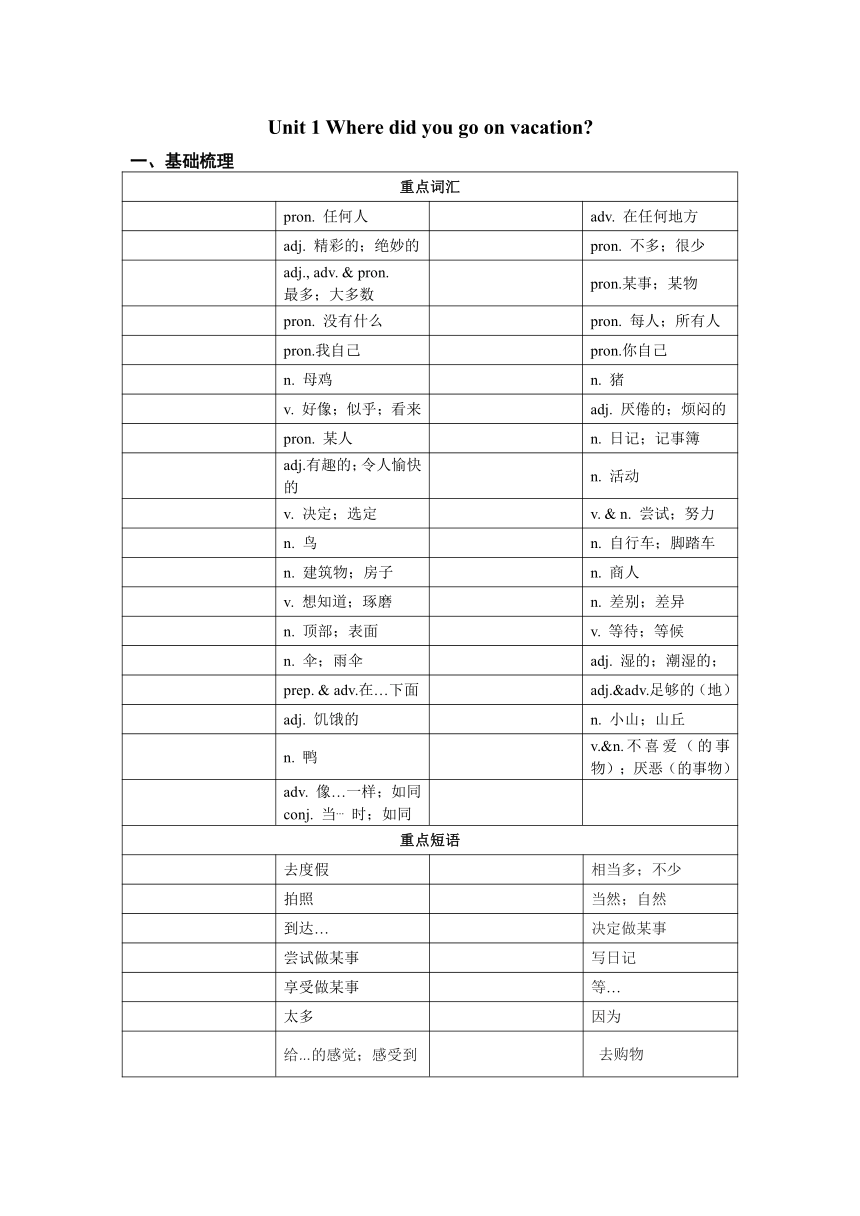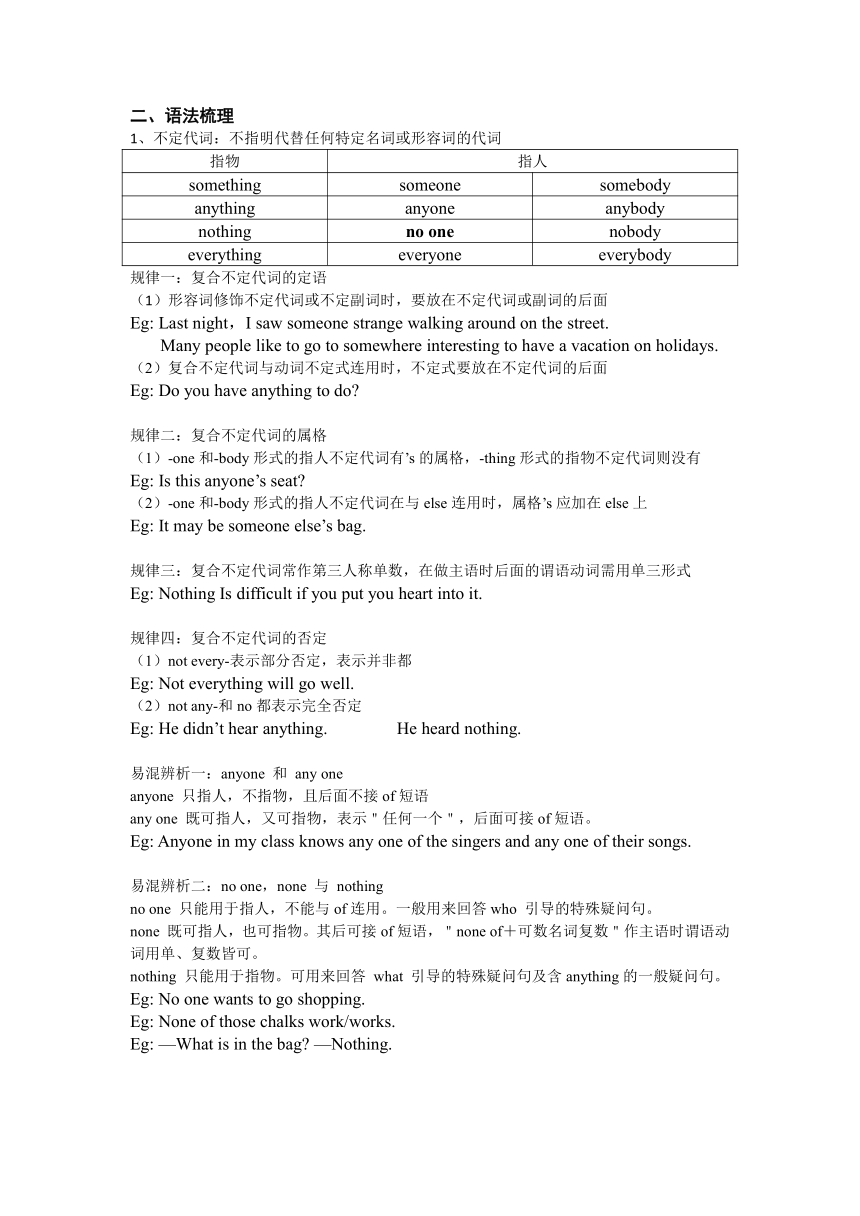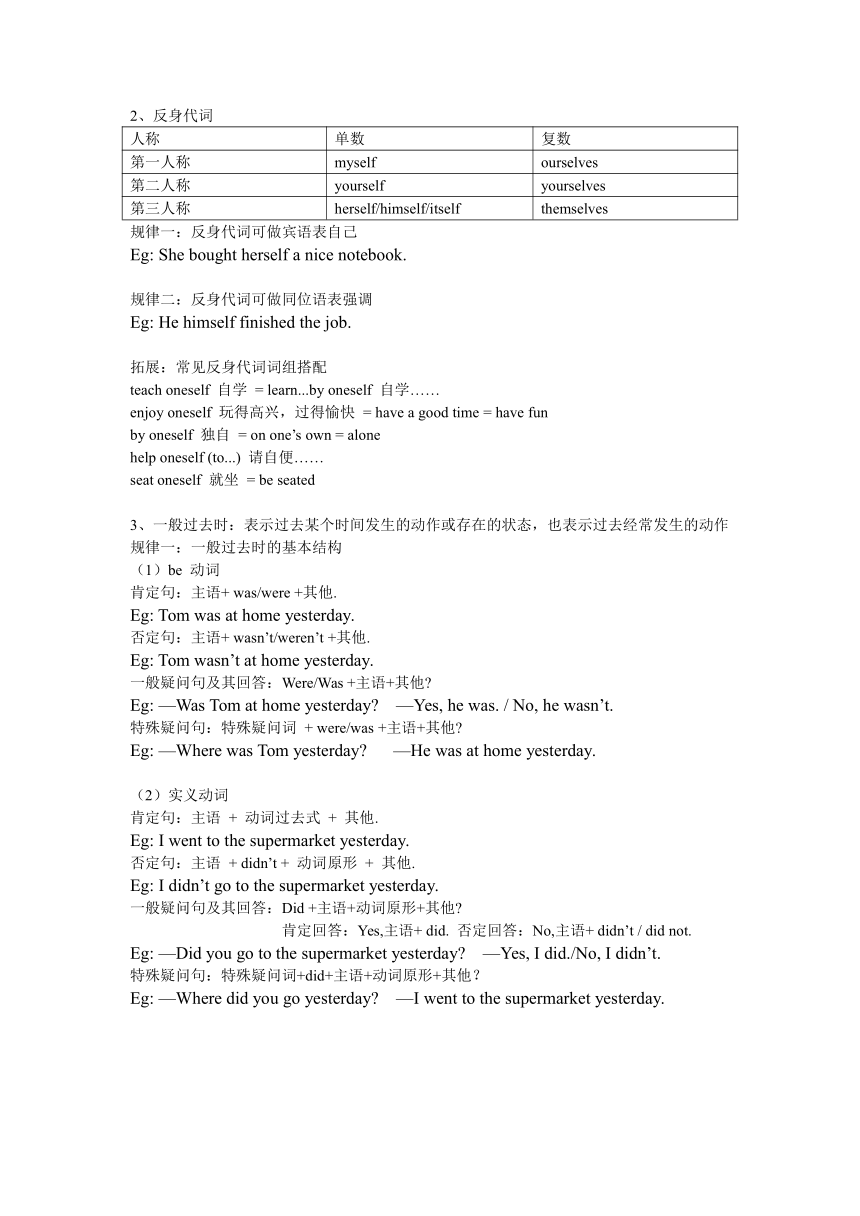Unit1 Where did you go on vacation学案人教版英语八年级上册
文档属性
| 名称 | Unit1 Where did you go on vacation学案人教版英语八年级上册 |

|
|
| 格式 | docx | ||
| 文件大小 | 31.7KB | ||
| 资源类型 | 教案 | ||
| 版本资源 | 人教新目标(Go for it)版 | ||
| 科目 | 英语 | ||
| 更新时间 | 2024-09-06 13:45:49 | ||
图片预览



文档简介
Unit 1 Where did you go on vacation
基础梳理
重点词汇
pron. 任何人 adv. 在任何地方
adj. 精彩的;绝妙的 pron. 不多;很少
adj., adv. & pron. 最多;大多数 pron.某事;某物
pron. 没有什么 pron. 每人;所有人
pron.我自己 pron.你自己
n. 母鸡 n. 猪
v. 好像;似乎;看来 adj. 厌倦的;烦闷的
pron. 某人 n. 日记;记事簿
adj.有趣的;令人愉快的 n. 活动
v. 决定;选定 v. & n. 尝试;努力
n. 鸟 n. 自行车;脚踏车
n. 建筑物;房子 n. 商人
v. 想知道;琢磨 n. 差别;差异
n. 顶部;表面 v. 等待;等候
n. 伞;雨伞 adj. 湿的;潮湿的;
prep. & adv.在…下面 adj.&adv.足够的(地)
adj. 饥饿的 n. 小山;山丘
n. 鸭 v.&n.不喜爱(的事物);厌恶(的事物)
adv. 像…一样;如同 conj. 当 时;如同
重点短语
去度假 相当多;不少
拍照 当然;自然
到达… 决定做某事
尝试做某事 写日记
享受做某事 等…
太多 因为
给…的感觉;感受到 去购物
语法梳理
不定代词:不指明代替任何特定名词或形容词的代词
指物 指人
something someone somebody
anything anyone anybody
nothing no one nobody
everything everyone everybody
规律一:复合不定代词的定语
(1)形容词修饰不定代词或不定副词时,要放在不定代词或副词的后面
Eg: Last night,I saw someone strange walking around on the street.
Many people like to go to somewhere interesting to have a vacation on holidays.
(2)复合不定代词与动词不定式连用时,不定式要放在不定代词的后面
Eg: Do you have anything to do
规律二:复合不定代词的属格
-one和-body形式的指人不定代词有’s的属格,-thing形式的指物不定代词则没有
Eg: Is this anyone’s seat
-one和-body形式的指人不定代词在与else连用时,属格’s应加在else上
Eg: It may be someone else’s bag.
规律三:复合不定代词常作第三人称单数,在做主语时后面的谓语动词需用单三形式
Eg: Nothing Is difficult if you put you heart into it.
规律四:复合不定代词的否定
(1)not every-表示部分否定,表示并非都
Eg: Not everything will go well.
(2)not any-和no都表示完全否定
Eg: He didn’t hear anything. He heard nothing.
易混辨析一:anyone 和 any one
anyone 只指人,不指物,且后面不接of短语
any one 既可指人,又可指物,表示"任何一个",后面可接of短语。
Eg: Anyone in my class knows any one of the singers and any one of their songs.
易混辨析二:no one,none 与 nothing
no one 只能用于指人,不能与of连用。一般用来回答who 引导的特殊疑问句。
none 既可指人,也可指物。其后可接of短语,"none of+可数名词复数"作主语时谓语动词用单、复数皆可。
nothing 只能用于指物。可用来回答 what 引导的特殊疑问句及含anything的一般疑问句。
Eg: No one wants to go shopping.
Eg: None of those chalks work/works.
Eg: —What is in the bag —Nothing.
反身代词
人称 单数 复数
第一人称 myself ourselves
第二人称 yourself yourselves
第三人称 herself/himself/itself themselves
规律一:反身代词可做宾语表自己
Eg: She bought herself a nice notebook.
规律二:反身代词可做同位语表强调
Eg: He himself finished the job.
拓展:常见反身代词词组搭配
teach oneself 自学 = learn...by oneself 自学……
enjoy oneself 玩得高兴,过得愉快 = have a good time = have fun
by oneself 独自 = on one’s own = alone
help oneself (to...) 请自便……
seat oneself 就坐 = be seated
一般过去时:表示过去某个时间发生的动作或存在的状态,也表示过去经常发生的动作
规律一:一般过去时的基本结构
be 动词
肯定句:主语+ was/were +其他.
Eg: Tom was at home yesterday.
否定句:主语+ wasn’t/weren’t +其他.
Eg: Tom wasn’t at home yesterday.
一般疑问句及其回答:Were/Was +主语+其他
Eg: —Was Tom at home yesterday —Yes, he was. / No, he wasn’t.
特殊疑问句:特殊疑问词 + were/was +主语+其他
Eg: —Where was Tom yesterday —He was at home yesterday.
实义动词
肯定句:主语 + 动词过去式 + 其他.
Eg: I went to the supermarket yesterday.
否定句:主语 + didn’t + 动词原形 + 其他.
Eg: I didn’t go to the supermarket yesterday.
一般疑问句及其回答:Did +主语+动词原形+其他
肯定回答:Yes,主语+ did. 否定回答:No,主语+ didn’t / did not.
Eg: —Did you go to the supermarket yesterday —Yes, I did./No, I didn’t.
特殊疑问句:特殊疑问词+did+主语+动词原形+其他?
Eg: —Where did you go yesterday —I went to the supermarket yesterday.
规律二:一般过去时的构成
情况 构成方法 例词
一般情况 加ed learn→learned,help→helped
以不发音的字母e结尾 加d hope→hoped,like→liked
以辅音字母+y结尾 变y为i,再加ed carry→carried,study→studied
结尾只有一个辅音字母的重读闭音节词 双写末尾辅音字母,再加ed stop→stopped,plan→planned
规律三:一般过去时的判断:通过句子中是否有表示过去的时间状语来判定。
(1)介词+表示过去时间的年、月、日,如 in 1983 等
(2)yesterday 以及由 yesterday 构成的短语:yesterday morning/afternoon/evening,the day before yesterday
(3)带有 ago 的短语,如 three days ago,five years ago
(4) last 构成的短语,如 last week/year/month 等
(5)表示过去的词或短语,如 once,at that time,just now 等
固定搭配与词组
try doing sth.尝试着做某事
Eg: The boy tried making a card.
try to do sth. 尽力、设法去做某事
Eg: He tried to carry the bucket.
because of 短语介词,后可接名词、代词或名词性成分
Eg: We didn’t get there in time because of the heavy rain.
because 连词,引导状语从句,后面接句子表明直接、明确的原因或理由
Eg: We didn’t get there in time because it rained heavily.
enough 修饰名词时,常放在名词的前面
Eg: There is enough water for everyone.
enough 修饰形容词、副词时,常放在它们的后面
Eg: He is tall enough to play basketball.
arrive in 表示到达较大的地方,如国家、省、市等
Eg: We arrived in Beijing yesterday.
arrive at 表示到达较小的地方,如商店、广场、家等。
Eg: She arrived at the supermarket very quickly.
seem常用句型:
主语+seem+(to be+)表语(多为形容词或名词)
Eg: You seem to be very happy today.
It seems + that 从句
Eg: It seems that it will rain.
主语 + seem + 动词不定式
Eg: Dr.Li seems to know everything.
too many 太多,修饰可数名词复数
too much 太多,修饰不可数名词
much too 太,表程度,常用来修饰形容词
随堂检测
单选
( )1. She is new here,so she has _______friends at school.
A. Much B. Few C, little D. A little
( )2. —Steven, can you help me buy some meat
—_____,I like shopping.
A.What a pity B.I’m sorry
C.Of course D.You’re welcome
( )3. Do you read today’s newspaper There is _____ in it.
A. Something interesting B. anything new
C. Everything important D. nothing special
( )4.He didn’t go to school today ____bad cough.
A,as a result B.because C.so D.because of
( )5. My family decide _____to the beach this week.
A.go B.goes C.to go D.going
( )6. He didn’t see the question________, although he had ________ to do that.
A. careful enough; enough time B. carefully enough; enough time
C. enough careful; enough time D. enough carefully; time enough
( )7.I have _______ homework to do and I’m _______ tired now.
A. much too; too much B. much too; much too
C. Too much; too much D. Too much; much too
( )8.Tim, your mother is waiting _____ you at the school gate.
A.for B.at C.with D.as
( )9. No one taught me English . I learned it by _____ .
A.I B.my C.mine D.myself
( )10. This question is difficult for me, but I try _____ it confidently.
to answer B.answering C.answered D.to be answered
完型
David and Frank camped out with their parents.They went to the lake by car.And it took__41__two hours to get there.When they got there, they were__42__ to see the green trees and the beautiful lake.The house near the lake looked nice.They would live in it__43__ two days.
When their parents unloaded(卸货) the car, the children ran to the lake.
“Don't get into the__44__before we come, ” the father and the mother shouted together.
“All right, ” they answered and__45__ their parents.
After their parents joined them, they swam for a long time.Then they felt __46__ and went back to have some food.Though(尽管) the rooms were small, __47__ their beds were comfortable(舒适的). They __48__ well at night.
The next day, they woke up early and looked outside.They __49__ their parents walking around the lake.They got up quickly and ran outside to play.
The children liked __50__ there.They had a good time.
( )41.A.us B.them C. you D. him
( )42.A.sad B.tired C. angry D.happy
( )43.A.at B.in C.for D. between
( )44.A.lake B. mountain C.house D.car
( )45.A.played with B.woke up C.waited for D.shouted to
( )46.A.full B.cold C.hungry D.shy
( )47.A./ B.so C.and D.or
( )48.A.worked B.woke C.helped D.slept
( )49.A.tried B.saw C.learned D.followed
( )50.A.nothing B. anyone C. everything D.everyone
课后巩固
完成句子
1. She went to Nanjing yesterday. (对划线部分提问)
________ ________ she ________ yesterday
2. I haven't seen you for a long time. (改为同义句)
________ ________ no ________ .
3. He made a decision to go by subway.(改为同义句)
He ________ ________ go by subway.
4. She doesn't go to school because it is snowing heavily.(改为同义句)
She doesn't go to school ________ ________ the heavy snow.
5.Don’t forget to turn off the lights when you go out.(改为同义句)
________ ________ turn off the lights when you go out.
6.你为什么不给自己买点东西呢?
________ didn't you buy for ________
7.他爸爸似乎很累。
His father ________ ________ ________very tired.
8.你喜欢踢足球吗?
Do you ________ ________ ________football
9.他是多么开朗的一个男孩啊!
________ ________outgoing boy ________ ________!
10.上周末你去哪里度假了?
Where ________ you go ________ ________ last weekend
基础梳理
重点词汇
pron. 任何人 adv. 在任何地方
adj. 精彩的;绝妙的 pron. 不多;很少
adj., adv. & pron. 最多;大多数 pron.某事;某物
pron. 没有什么 pron. 每人;所有人
pron.我自己 pron.你自己
n. 母鸡 n. 猪
v. 好像;似乎;看来 adj. 厌倦的;烦闷的
pron. 某人 n. 日记;记事簿
adj.有趣的;令人愉快的 n. 活动
v. 决定;选定 v. & n. 尝试;努力
n. 鸟 n. 自行车;脚踏车
n. 建筑物;房子 n. 商人
v. 想知道;琢磨 n. 差别;差异
n. 顶部;表面 v. 等待;等候
n. 伞;雨伞 adj. 湿的;潮湿的;
prep. & adv.在…下面 adj.&adv.足够的(地)
adj. 饥饿的 n. 小山;山丘
n. 鸭 v.&n.不喜爱(的事物);厌恶(的事物)
adv. 像…一样;如同 conj. 当 时;如同
重点短语
去度假 相当多;不少
拍照 当然;自然
到达… 决定做某事
尝试做某事 写日记
享受做某事 等…
太多 因为
给…的感觉;感受到 去购物
语法梳理
不定代词:不指明代替任何特定名词或形容词的代词
指物 指人
something someone somebody
anything anyone anybody
nothing no one nobody
everything everyone everybody
规律一:复合不定代词的定语
(1)形容词修饰不定代词或不定副词时,要放在不定代词或副词的后面
Eg: Last night,I saw someone strange walking around on the street.
Many people like to go to somewhere interesting to have a vacation on holidays.
(2)复合不定代词与动词不定式连用时,不定式要放在不定代词的后面
Eg: Do you have anything to do
规律二:复合不定代词的属格
-one和-body形式的指人不定代词有’s的属格,-thing形式的指物不定代词则没有
Eg: Is this anyone’s seat
-one和-body形式的指人不定代词在与else连用时,属格’s应加在else上
Eg: It may be someone else’s bag.
规律三:复合不定代词常作第三人称单数,在做主语时后面的谓语动词需用单三形式
Eg: Nothing Is difficult if you put you heart into it.
规律四:复合不定代词的否定
(1)not every-表示部分否定,表示并非都
Eg: Not everything will go well.
(2)not any-和no都表示完全否定
Eg: He didn’t hear anything. He heard nothing.
易混辨析一:anyone 和 any one
anyone 只指人,不指物,且后面不接of短语
any one 既可指人,又可指物,表示"任何一个",后面可接of短语。
Eg: Anyone in my class knows any one of the singers and any one of their songs.
易混辨析二:no one,none 与 nothing
no one 只能用于指人,不能与of连用。一般用来回答who 引导的特殊疑问句。
none 既可指人,也可指物。其后可接of短语,"none of+可数名词复数"作主语时谓语动词用单、复数皆可。
nothing 只能用于指物。可用来回答 what 引导的特殊疑问句及含anything的一般疑问句。
Eg: No one wants to go shopping.
Eg: None of those chalks work/works.
Eg: —What is in the bag —Nothing.
反身代词
人称 单数 复数
第一人称 myself ourselves
第二人称 yourself yourselves
第三人称 herself/himself/itself themselves
规律一:反身代词可做宾语表自己
Eg: She bought herself a nice notebook.
规律二:反身代词可做同位语表强调
Eg: He himself finished the job.
拓展:常见反身代词词组搭配
teach oneself 自学 = learn...by oneself 自学……
enjoy oneself 玩得高兴,过得愉快 = have a good time = have fun
by oneself 独自 = on one’s own = alone
help oneself (to...) 请自便……
seat oneself 就坐 = be seated
一般过去时:表示过去某个时间发生的动作或存在的状态,也表示过去经常发生的动作
规律一:一般过去时的基本结构
be 动词
肯定句:主语+ was/were +其他.
Eg: Tom was at home yesterday.
否定句:主语+ wasn’t/weren’t +其他.
Eg: Tom wasn’t at home yesterday.
一般疑问句及其回答:Were/Was +主语+其他
Eg: —Was Tom at home yesterday —Yes, he was. / No, he wasn’t.
特殊疑问句:特殊疑问词 + were/was +主语+其他
Eg: —Where was Tom yesterday —He was at home yesterday.
实义动词
肯定句:主语 + 动词过去式 + 其他.
Eg: I went to the supermarket yesterday.
否定句:主语 + didn’t + 动词原形 + 其他.
Eg: I didn’t go to the supermarket yesterday.
一般疑问句及其回答:Did +主语+动词原形+其他
肯定回答:Yes,主语+ did. 否定回答:No,主语+ didn’t / did not.
Eg: —Did you go to the supermarket yesterday —Yes, I did./No, I didn’t.
特殊疑问句:特殊疑问词+did+主语+动词原形+其他?
Eg: —Where did you go yesterday —I went to the supermarket yesterday.
规律二:一般过去时的构成
情况 构成方法 例词
一般情况 加ed learn→learned,help→helped
以不发音的字母e结尾 加d hope→hoped,like→liked
以辅音字母+y结尾 变y为i,再加ed carry→carried,study→studied
结尾只有一个辅音字母的重读闭音节词 双写末尾辅音字母,再加ed stop→stopped,plan→planned
规律三:一般过去时的判断:通过句子中是否有表示过去的时间状语来判定。
(1)介词+表示过去时间的年、月、日,如 in 1983 等
(2)yesterday 以及由 yesterday 构成的短语:yesterday morning/afternoon/evening,the day before yesterday
(3)带有 ago 的短语,如 three days ago,five years ago
(4) last 构成的短语,如 last week/year/month 等
(5)表示过去的词或短语,如 once,at that time,just now 等
固定搭配与词组
try doing sth.尝试着做某事
Eg: The boy tried making a card.
try to do sth. 尽力、设法去做某事
Eg: He tried to carry the bucket.
because of 短语介词,后可接名词、代词或名词性成分
Eg: We didn’t get there in time because of the heavy rain.
because 连词,引导状语从句,后面接句子表明直接、明确的原因或理由
Eg: We didn’t get there in time because it rained heavily.
enough 修饰名词时,常放在名词的前面
Eg: There is enough water for everyone.
enough 修饰形容词、副词时,常放在它们的后面
Eg: He is tall enough to play basketball.
arrive in 表示到达较大的地方,如国家、省、市等
Eg: We arrived in Beijing yesterday.
arrive at 表示到达较小的地方,如商店、广场、家等。
Eg: She arrived at the supermarket very quickly.
seem常用句型:
主语+seem+(to be+)表语(多为形容词或名词)
Eg: You seem to be very happy today.
It seems + that 从句
Eg: It seems that it will rain.
主语 + seem + 动词不定式
Eg: Dr.Li seems to know everything.
too many 太多,修饰可数名词复数
too much 太多,修饰不可数名词
much too 太,表程度,常用来修饰形容词
随堂检测
单选
( )1. She is new here,so she has _______friends at school.
A. Much B. Few C, little D. A little
( )2. —Steven, can you help me buy some meat
—_____,I like shopping.
A.What a pity B.I’m sorry
C.Of course D.You’re welcome
( )3. Do you read today’s newspaper There is _____ in it.
A. Something interesting B. anything new
C. Everything important D. nothing special
( )4.He didn’t go to school today ____bad cough.
A,as a result B.because C.so D.because of
( )5. My family decide _____to the beach this week.
A.go B.goes C.to go D.going
( )6. He didn’t see the question________, although he had ________ to do that.
A. careful enough; enough time B. carefully enough; enough time
C. enough careful; enough time D. enough carefully; time enough
( )7.I have _______ homework to do and I’m _______ tired now.
A. much too; too much B. much too; much too
C. Too much; too much D. Too much; much too
( )8.Tim, your mother is waiting _____ you at the school gate.
A.for B.at C.with D.as
( )9. No one taught me English . I learned it by _____ .
A.I B.my C.mine D.myself
( )10. This question is difficult for me, but I try _____ it confidently.
to answer B.answering C.answered D.to be answered
完型
David and Frank camped out with their parents.They went to the lake by car.And it took__41__two hours to get there.When they got there, they were__42__ to see the green trees and the beautiful lake.The house near the lake looked nice.They would live in it__43__ two days.
When their parents unloaded(卸货) the car, the children ran to the lake.
“Don't get into the__44__before we come, ” the father and the mother shouted together.
“All right, ” they answered and__45__ their parents.
After their parents joined them, they swam for a long time.Then they felt __46__ and went back to have some food.Though(尽管) the rooms were small, __47__ their beds were comfortable(舒适的). They __48__ well at night.
The next day, they woke up early and looked outside.They __49__ their parents walking around the lake.They got up quickly and ran outside to play.
The children liked __50__ there.They had a good time.
( )41.A.us B.them C. you D. him
( )42.A.sad B.tired C. angry D.happy
( )43.A.at B.in C.for D. between
( )44.A.lake B. mountain C.house D.car
( )45.A.played with B.woke up C.waited for D.shouted to
( )46.A.full B.cold C.hungry D.shy
( )47.A./ B.so C.and D.or
( )48.A.worked B.woke C.helped D.slept
( )49.A.tried B.saw C.learned D.followed
( )50.A.nothing B. anyone C. everything D.everyone
课后巩固
完成句子
1. She went to Nanjing yesterday. (对划线部分提问)
________ ________ she ________ yesterday
2. I haven't seen you for a long time. (改为同义句)
________ ________ no ________ .
3. He made a decision to go by subway.(改为同义句)
He ________ ________ go by subway.
4. She doesn't go to school because it is snowing heavily.(改为同义句)
She doesn't go to school ________ ________ the heavy snow.
5.Don’t forget to turn off the lights when you go out.(改为同义句)
________ ________ turn off the lights when you go out.
6.你为什么不给自己买点东西呢?
________ didn't you buy for ________
7.他爸爸似乎很累。
His father ________ ________ ________very tired.
8.你喜欢踢足球吗?
Do you ________ ________ ________football
9.他是多么开朗的一个男孩啊!
________ ________outgoing boy ________ ________!
10.上周末你去哪里度假了?
Where ________ you go ________ ________ last weekend
同课章节目录
- Unit 1 Where did you go on vacation?
- Section A
- Section B
- Unit 2 How often do you exercise?
- Section A
- Section B
- Unit 3 I'm more outgoing than my sister.
- Section A
- Section B
- Unit 4 What's the best movie theater?
- Section A
- Section B
- Unit 5 Do you want to watch a game show?
- Section A
- Section B
- Unit 6 I'm going to study computer science.
- Section A
- Section B
- Unit 7 Will people have robots?
- Section A
- Section B
- Unit 8 How do you make a banana milk shake?
- Section A
- Section B
- Unit 9 Can you come to my party?
- Section A
- Section B
- Unit 10 If you go to the party, you'll have a grea
- Section A
- Section B
